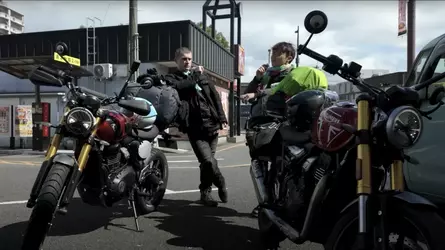By Chris Lau and Minori Konishi, CNN
Sat April 5, 2025

US game streamer Ludwig Ahgren and his friend Michael Reeves travel across Japan without their smartphones.
No map. No smartphones. No expressways. Just two motorbikes and some basic Japanese.
These are the rules American game streamer Ludwig Ahgren and his YouTuber buddy Michael Reeves have imposed on themselves as they embark on a journey to traverse Japan on motorbikes.
The friends ditched the smartphones that are a staple of their generation and set off without so much as a guidebook.
That left them no option but to mingle with locals to get directions, sparking encounters that have unlocked a full display of friendliness from Japanese people.
The journey from Cape Sata at the southern tip of Kyushu to Cape Soya, the northernmost point of Hokkaido, is about 2,000 miles – or it would be, if they hadn’t gotten lost already.
It took them two weeks to complete the trip, according to a finale video posted Saturday on Ahgren’s YouTube channel. A team had been responsible for tracking the pair and uploading videos of the journey since they hit the road two weeks ago, enjoying some of Japan’s most unique scenery, culture and cuisine along the way.
It was no easy quest, acknowledged Ahgren, one of the world’s most successful game streamers with 6.7 million subscribers on YouTube. “We are doing this the hard way,” he quipped in a video before hopping on his motorbike.
“I’ve realized I have become addicted to this thing,” he said in the video, referring to his smartphone. “But now, I can’t use it to go on Yelp to find the best place to eat, Google Maps to figure out how to get there, Google Translate to figure out what to order when I get there.”
CNN reached out to the pair during their trip but did not hear back – probably a sign they didn’t have their smartphone on.


Left: Fuji Mountain at Kawaguchiko Lake, Japan.
Right: Deer at Nara park during a sunny day in the cherry blossom season, Japan.
They cruised through the bustling capital Tokyo, the tree-blanketed countryside of Miyazaki, fed crackers to deer in Nara, and caught a glimpse of cherry blossoms in Shizuoka – where they also ate a picnic against the backdrop of Mount Fuji.
Throughout their journey, they sampled an abundance of Japanese food from udon noodles to okonomiyaki, a savory pancake dish from Osaka. When they fell behind schedule, they grabbed quick bites from Japan’s ubiquitous convenience stores or cup noodles from vending machines.
But the journey was not without its setbacks.
With no map, they mistook Miyazaki in southeastern Kyushu for Shikoku, Japan’s fourth-biggest island, which is linked by bridges to the country’s major island. They turned up in the city, only to find they could not be more lost.
The pair also hoped to check out a sumo wrestling match. They decided to park the bikes and travel by public transport but, without a smartphone, it took them three hours to navigate Japan’s notoriously headache-triggering train system.
When they eventually arrived at Osaka’s Edion Arena, they saw a sign, written in English. “Tickets sold out,” it said.
Help from friendly locals
Ahgren initially relied on instinct to guess what Japanese people were saying, according to his YouTube videos. Locals went out of their way to help, doing everything they could to overcome the language barrier.“Ichiban” – meaning “number one” or “the best” – became Ahgren’s favorite Japanese word when he asked for hotel and restaurant recommendations, and “nan-jikan” – “how many hours?” – when he needed information about his journey.
One man bought the pair coffee at a convenience store before giving them directions with his car. And a woman tried to explain to them that the nearest hotel was next to a sports ground by gesturing a baseball swing.
But by day eight, Ahgren was touting how staff at a restaurant complimented him on his language skills with “nihongo jouzu” – “good Japanese.”
“They freaking said it,” he said proudly in a video.
Past disruptive influencers
Ahgren and Reeves’ style of travel strikes a stark contrast to a group of influencers who previously raised eyebrows in the country for their disruptive stunts.Jeffrey Hall, special lecturer at Kanda University of International Studies in Japan, said there has been rising sentiment in the country against misbehaving tourists – including social media influencers – as the number of visitors hit a record high.
“There is a phenomenon of people who come here to make content that is provocative and annoying to other people around them… That particular type of nuisance YouTuber or nuisance influencer have really damaged the image of foreign influencers in general,” he said.
They included American live-streamer Ramsey Khalid Ismael, better known by his online alias “Johnny Somali,” who was arrested in late 2023 for breaking into a construction site in Osaka. He also sparked outrage by posting videos of himself taunting commuters about the atomic bombings of Hiroshima and Nagasaki.
That year, a railway company also launched a probe against four popular YouTubers over their stunt to evade fares on public transport, according to local media.
But Ahgren and Reeves’ trip had spotlighted parts of Japan less well known by international tourists, and their use of simple Japanese would be appreciated by locals, Hall said.
Ahgren, who often points the camera away when talking to people, is different from the “nuisance travelers,” as he shows better understanding of social norms, one of which is not to film people without their permission, he added.
“That’s something that a lot of American streamers do without even thinking of the consequences, but in Japan people value their privacy very much,” he said.
